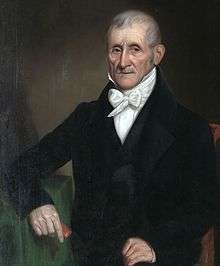Caleb Tompkins
Caleb Tompkins (December 22, 1759 – January 1, 1846) was a U.S. Representative from New York, and the brother of Vice President Daniel D. Tompkins.
Caleb Tompkins | |
|---|---|
 | |
| Member of the U.S. House of Representatives from New York's 3rd district | |
| In office 1817–1821 | |
| Preceded by | Jonathan Ward |
| Succeeded by | Jeremiah H. Pierson |
| Member of the New York State Assembly for Westchester County | |
| In office 1804–1806 | |
| Personal details | |
| Born | December 22, 1759 Scarsdale, New York, United States |
| Died | January 1, 1846 (aged 86) Scarsdale, New York, United States |
| Resting place | First Presbyterian Church Cemetery, White Plains, New York, United States |
| Political party | Republican |
| Other political affiliations |
|
| Relatives | Daniel D. Tompkins (brother) |
Early life
Caleb Tompkins was born on the Fox Meadows estate near Scarsdale, New York on December 22, 1759, and was the eldest son of Jonathan G. Tompkins, a prominent judge and landowner. He was educated locally, and trained for a legal career.[1][2]
American Revolution
Tompkins served as a Private in the 2nd Regiment of Westchester County Militia (Thomas's Regiment) during the American Revolution.[3][4] In October, 1776 he fled his home to escape British troops, successfully evading capture by submerging himself in a nearby swamp.[5] This incident was known to James Fenimore Cooper, who used a fictionalized version of it in his 1821 novel The Spy.[6][7]
Tompkins remained in the militia after the war, and was a Captain when he resigned in 1797.[8][9]
Career
Tompkins studied law, attained admission to the bar, and practiced in Westchester County. He also inherited Fox Meadows, where he resided throughout his life.[10]
An Anti-Federalist who became a member of the Democratic-Republican Party and later a Democrat who identified with the Bucktails and Jacksonians, he was Scarsdale's first Town Clerk, and held other local offices including Town Supervisor.[11][12][13]
Tompkins was a member of the New York State Assembly from 1804 to 1806.[14] He served as Judge of the Westchester County Court from 1807 to 1820.[15]
Tompkins was elected to the Fifteenth and Sixteenth Congresses, and served from March 4, 1817 to March 3, 1821.[16]
In 1823 Tompkins returned to the position of Westchester County Judge, and he remained on the bench until his death.[17] In 1828 he was an unsuccessful candidate for Congress, losing a narrow contest to Henry B. Cowles.
Death and burial
Tompkins died in Scarsdale on January 1, 1846.[18][19] He was interred in the First Presbyterian Church Cemetery in White Plains.[20]
References
- Marquis Who's Who, Who Was Who in America, 1963, page 533
- Lyman Horace Weeks, John Hampden Dougherty, Legal and Judicial History of New York, Volume 3, 1911, page 112
- Frank Lindsay Crawford, Charlotte Holmes Crawford, Morris D'Camp Crawford and His Wife, Charlotte Holmes Crawford: Their Lives, Ancestries and Descendants, 1939, page 7
- New York Genealogical and Biographical Society, The New York Genealogical and Biographical Record, Volume 112, 1981, page 95
- Porter Sargent, A Handbook of New England, page 236
- Sarah Comstock, Old Roads from the Heart of New York, 1915, page 293
- John Thomas Scharf, editor, History of Westchester County: New York, Volume 1, Part 2, 1886, page 664
- Hugh Hastings, State Historian, Henry Harmon Noble, Chief Clerk, Military Minutes of the Council of Appointment of the State of New York, 1783-1821., Volume 1, 1901
- New York State Legislature, Documents of the Senate of the State of New York, Volume 9, 1902, page 365
- Silas Constant, Emily Warren Roebling, The Journal of the Reverend Silas Constant, 1903, page 133
- Sean Wilentz, The Rise of American Democracy: Jefferson to Lincoln, 2006, page 234
- John Thomas Scharf, History of Westchester County: New York, Volume 1, 1886, page 662
- Westchester County Board of Supervisors, Proceedings of the County Board of Legislators of Westchester County, N.Y., 1795, page 148
- Stephen C. Hutchins, Edgar Albert Werner, Civil List and Constitutional History of the Colony and State of New York, 1891, pages 464-465
- Henry Townsend Smith, Manual of Westchester County: Past and Present, Volume 3, 1913, page 215
- Charles Lanman, Dictionary of the United States Congress, 2006, page 379
- Henry Townsend Smith, Manual of Westchester County: Past and Present, Volume 3, 1913, page 215
- John Thomas Scharf, History of Westchester County: New York, Volume 1, 1886, page 662
- Westchester County Board of Supervisors, Proceedings of the County Board of Legislators of Westchester County, N.Y., 1795, page 148
- Thomas E. Spencer, Where They're Buried, 1998, page 254
External links
- United States Congress. "Caleb Tompkins (id: T000303)". Biographical Directory of the United States Congress.
- Caleb Tompkins at Find a Grave
- Caleb Tompkins at Political Graveyard
- Caleb Tompkins at Our Campaigns.com
| U.S. House of Representatives | ||
|---|---|---|
| Preceded by Jonathan Ward |
Member of the U.S. House of Representatives from New York's 3rd congressional district 1817–1821 |
Succeeded by Jeremiah H. Pierson |